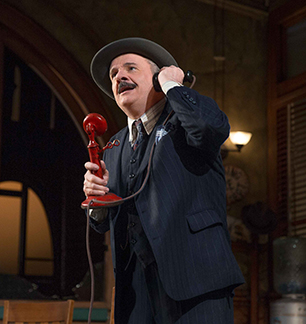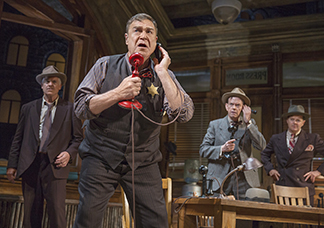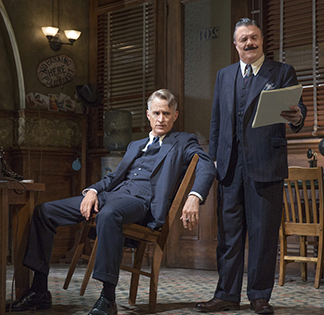
by Lucy Komisar
Nathan Lane is superb as the over-the-top newspaper editor Walter Burns in this near 90-year-old noirish comedy that has some political nuggets hidden in its hokey scenario. It‘s given a fine, only slightly tongue in cheek, reprise by director Jack O‘Brien.
Playwrights Ben Hecht and Charles MacArthur had been Chicago reporters, and the action takes place in the press room of Chicago’s Criminal Courts Building. The courts building shares the gallows courtyard with the county jail. Then anarchist Earl Williams (John Magaro), who is accused of killing a policeman and is going to be hanged, escapes.
Hecht and MacArthur were good reporters as well as fine playwrights. This 1928 play is not just a comic thriller. It is about political corruption, the use of race for electoral advantage, the hyping of the red menace — all not far off the mark for the present.
Williams is white and the policeman was black. The mayor (Dann Florek) and sheriff (John Goodman) want him executed to get black votes.

The mayor says, “Two years ago we almost lost the colored vote on account of that coon story you told.” The original production used nastier language.
So, they attempt to block delivery of the reprieve the governor has signed and give orders to shoot to kill the escapee.
There are also some tropes of the time about reds. The mayor says, “Reform the reds with a rope.” The only honest guy appears to be the anarchist. “Is it true you‘re on Trotsky‘s payroll?” the mayor asks. “I ain‘t a Bolshevik, I‘m an anarchist,” Williams says. “ For poor people crushed by the system. I ain‘t important. It‘s humanity that‘s important.”
The crime reporters are out for the story that occurred just beneath their noses. But, like today, most of them run in a pack. The exception is the inventive Hildy Johnson (John Slattery). Hildy is going to New York to work in advertising, which he suggests is a step up from the grungy newspaper business.

But tough-guy editor Burns, a terrifying screamer, is holding him hostage to get the one last scoop, to find Williams. Then the guy arrives through the window and pleads that he shot the cop by accident.
To keep him secure for an exclusive interview, they hide him in a roll-top desk. (The rest of the set is a pretty realistic wood table and chairs, with wood blinds on glass windows, which is how press rooms looked before TV designed them.)
Somehow, Slattery‘s Johnson doesn‘t seem smart or tough enough to be so enterprising. He is so blasé, he doesn’t look like he really cares. He is sure not the committed journalist who hunkers down to get the scoops. He looks like he belongs in advertising. But, stick with it till the denouement.
Jefferson Mays is great as Bensinger, an erudite, very pristine (especially about germs), not-one-of-the-gang reporter who likes poetry. In an in-joke among journalists everywhere, he is bribed to not interfere with the Hildy-Burns plot by the promise of a New York job. But stick with it till the dénouement, which won’t be revealed here.
Micah Stock does a comic turn in a small part as Woodenshoes Eichhorn, a fey cop with a funny accent, maybe Scandinavian. An unsung hero is Pincus (Robert Morse), who doesn‘t follow orders and instead waves around the governor‘s reprieve.
The women in the play are rather unimportant: Hildy‘s nonentity socialite fiancée (Halley Feiffer), her overbearing mother (Holland Taylor), and a prostitute, Mollie Malloy (Sherie Rene Scott), who befriended Williams. The only interesting female character is Jennie (Patrick Conolly), the cleaning lady. The authors‘ attitude towards women seems not very different from that of the reporters they have drawn.
But, otherwise, the play‘s politics was pretty advanced for its time. And this lively cinematic production is a diversion worth seeing.
“The Front Page.” Written by Ben Hecht and Charles MacArthur; directed by Jack O‘Brien. Broadhurst Theatre, 235 West 44th Street, New York City. 212-239-6200. Opened Oct 20, 2016, closes Jan 29, 2017. 12/18/16.

